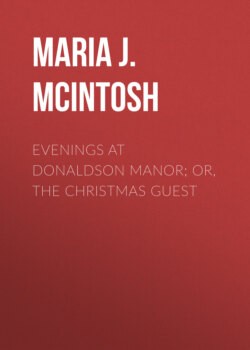Читать книгу Evenings at Donaldson Manor; Or, The Christmas Guest - Maria J. McIntosh - Страница 33
На сайте Литреса книга снята с продажи.
CHAPTER III.
ОглавлениеTable of Contents
The morning after Mr. Arlington had commenced our Christmas entertainments with the sketch of his friend Herbert Latimer's life, was dark and gloomy. At least, such was its aspect abroad, where leaden clouds covered the sky, and a cold, sleety rain fell fast; but within, all was bright, and warm, and cheerful. Immediately after breakfast we separated, each in search of amusement suited to his or her own tastes: some to the music room, some to the library, and Robert Dudley and Annie Donaldson to a game of battledore and shuttlecock in the wide hall, with Mr. Arlington for a spectator. As the storm increased, however, all seemed to feel the want of companionship, and without any preconcerted plan, we found ourselves, about two hours after breakfast, again assembled in the room in which quiet, patient Mrs. Donaldson sat, ravelling the netting of the last evening.
"Now for Aunt Nancy's portfolio," cried Annie, as soon as conversation began to flag.
The proposal was seconded so warmly that, as I could urge nothing against it, the portfolio was immediately produced, and Annie, taking possession of it, commissioned Robert Dudley to draw forth an engraving:—"Scene, a chamber by night, a sleeping baby and a sleepy mother, a basket of needle-work—I am sure it is needle-work—on the floor, and a cross suspended from the wall," said Annie, describing the engraving which she had taken from Robert.
"That cross looks promising," said Colonel Donaldson, who likes a little romance as well as any of his daughters. "Let us have the fair lady's history, Aunt Nancy."
"I know nothing about her," said I, with a smile at his eagerness.
"Then why, dear Aunt Nancy, did you keep the engraving?" asked Annie.
"I might answer, because of my interest in the scene it depicts—a scene in which religion seems to shed its sanctifying influence over the tenderest affection and the homeliest duties of our common life; but I had another reason."
"Ah! I knew it," exclaimed Annie.
"I first saw this print in company with a very cultivated and interesting German lady, to whose memory the sleeping baby recalled a cradle song written by her countryman, the brave Körner. She sang it for me, and as the German is, I am grieved to say, a sealed book to me, she gave me a literal translation of the words, which—"
"Which you have put into English verse, and written here at the back of the engraving in the finest of all fine writing, and which papa will put on his spectacles and read for us."
"No; I commission Mr. Arlington to do that," said the Colonel, "without his spectacles."
"First," said I, "let me assure you that the original is full of a simple, natural tenderness, which I fear, in the double process of translating and versifying, has entirely escaped."
Mr. Arlington, taking the paper from Annie, now read—
